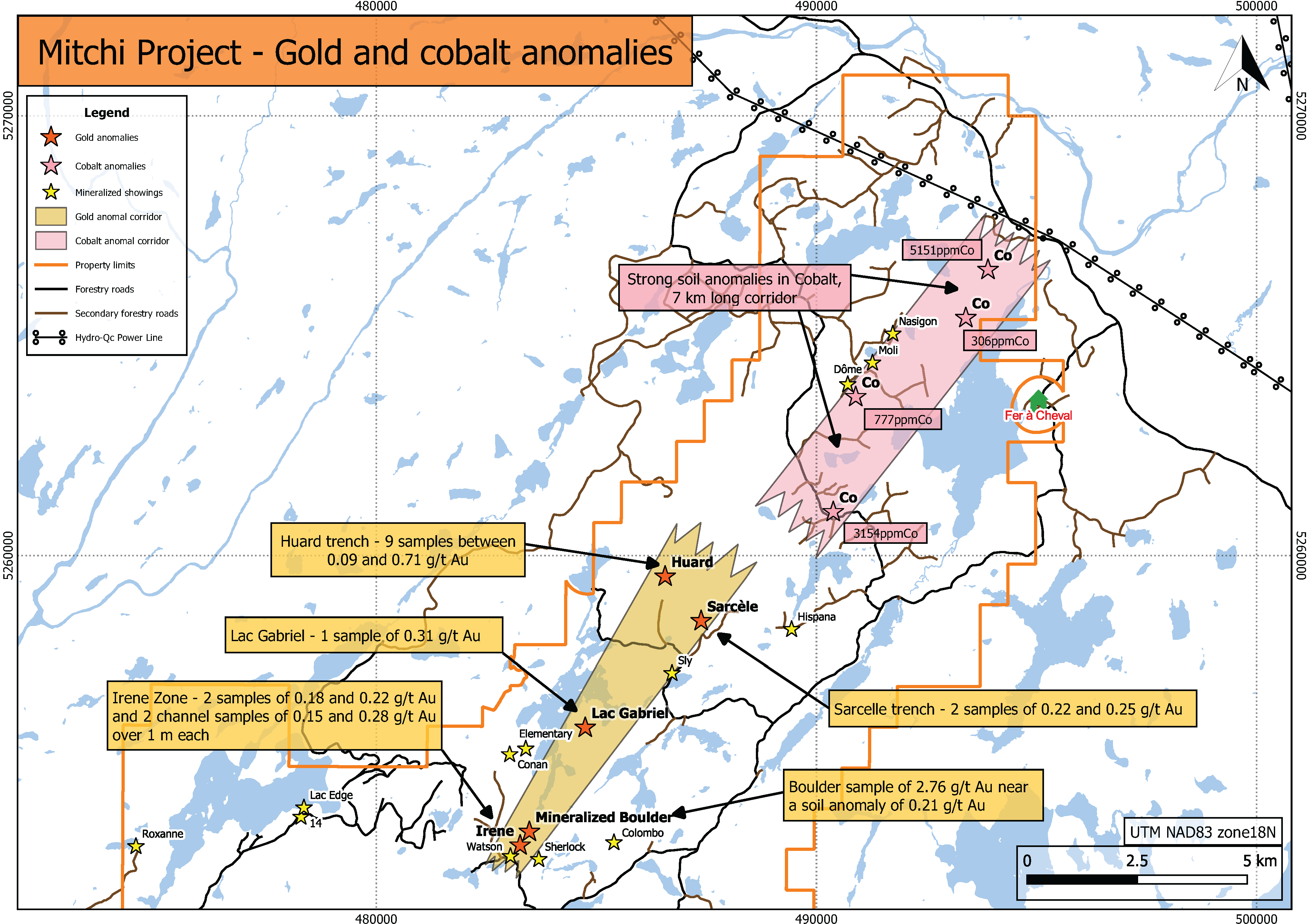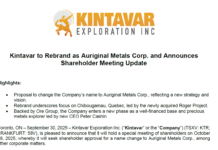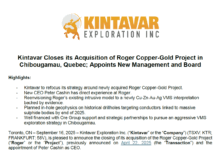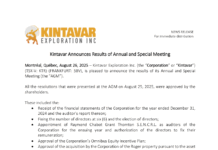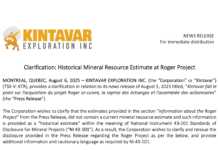Kintavar Drilling Results on Sherlock; Gold and Cobalt Trend Identified on Mitchi; Summer Exploration Begins
Montréal, Québec, June 17, 2020 – Kintavar Exploration Inc. (the “Corporation” or “Kintavar”) (TSX-V: KTR) (FRANKFURT: 58V), is pleased to announce the Sherlock corridor final winter drilling results and its comprehensive data compilation and analysis from the Mitchi project as it sets to begin its 2020 summer exploration program.
“The Mitchi project is now entering the next stage in its exploration. With the main Sherlock zone well defined and the extensions better understood, our focus is to find and test additional mineralized zones from surface that could have volume potential ultimately leading to multiple open pit targets having minimal strip ratio potential similar to what we see at Sherlock.” commented Kiril Mugerman, President & CEO of Kintavar Exploration.
“The Mitchi property does not lack exploration targets. In fact, the recent identification of the new gold and cobalt trends complement and adds to our traditional copper mineralization. This is very significant for Kintavar as it provides a new range of targets and a new area to explore. Furthermore, we are evaluating higher grade copper targets within trucking distance of Mitchi in order to be able to consider all these zones ultimately under one resource estimate of significant size. The objective would be to advance these new targets to a drilling stage as quickly as possible and to bring them to the level we currently have at Sherlock. The infrastructure and the location of the Mitchi project is its main advantage allowing to work multiple zones in order to build up a large resource.”
Sherlock Drilling
The Sherlock drilling program finished successfully with drill holes MS-19-62, 64 and 68 intersecting the mineralized horizons as expected (8.5m @ 0.73% Cu from surface, 16.1m @ 0.60% Cu from surface and 18.25m @ 0.43% Cu respectively) and confirmed that the mineralized horizons continue to the West and to the East. Figure 1, 2 and 3 show the plan view, cross section and the long section of the main Sherlock zone. Drilling as well suggests that mineralization remains open to the North and to the West as the units become more horizontal and gently dip deeper.
Drilling in the Watson, Irene and other Northern extensions has confirmed mineralization in drilling over 2.5km (until hole MS-20-89) where a regional fault truncates the mineralization (See Figure 4). Once outside of the main Sherlock area, less structural thickening has been identified from surface and more work is required to identify those favorable zones which are under thicker overburden in that part of the project.
Drilling in the Conan and Elementary zones (Figure 4) identified much more linear structures than the Sherlock zone and although mineralization has been confirmed in drilling over 1.5km, drilling did not identify to date any structural zones that could offer the same thickness as that identified at Sherlock. The units are continuous but due to lower widths and / or grades, the Conan and Elementary zones will be of lower priority for this summer’s exploration activities. Table 1 summarizes the highlights of this set of drilling results.
Data Compilation and Analysis
A comprehensive data compilation and analysis had been performed this spring and has revealed two significant trends which need further investigation (Figure 5 and 6):
- Gold trend between the Sherlock and Hispana corridors – Several soil anomalies, grab samples and channel samples have been identified with grades reaching as high as 2.76 g/t Au. The NE-SW trend, located within the sedimentary basin and associated with the stratiform copper mineralization, is sub-parallel to the major regional faults. This trend forms a significant anomaly which will be investigated. In addition, The Huard showing (Hispana Corridor) returned the highest density of anomalies with 9 samples returning grades between 0.09 and 0.71 g/t Au and between 0.21 and 1.65% Cu in a 30m by 5m trench.
- Cobalt trend between the Hispana and Nasigon corridors – Strong soil anomalies were identified which form the same NE-SW trend, sub-parallel to the major regional faults, similar to the gold trend. The anomalies go as high as 0.5% and 0.3% Co. The anomalies were identified within the sedimentary basin and appear to be associated with stratiform copper mineralization.
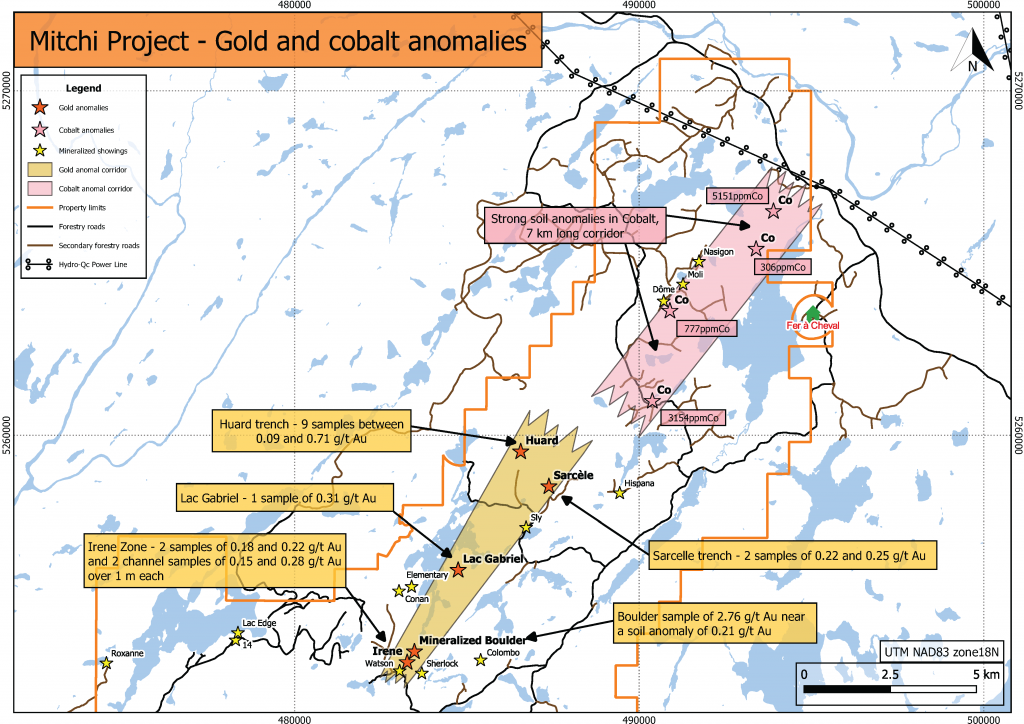
Figure 5 – Gold and cobalt trend on the Mitchi project
Summer Exploration Program
The summer exploration program is dedicated to identifying additional zones starting from surface that could provide either similar size to the Sherlock main zone or higher-grade zones. This focus is divided in four main objectives:
- Mitchi Au and Co trends that were recently identified
- Mitchi Cu anomalies that were highlighted from the recent works, data compilation and analysis
- High grade skarns in the surrounding properties such as Cousineau
- Cu anomalies of the Wabash project, a sedimentary basin with the same characteristics as the Mitchi basin, located 60 km North-East of Mitchi in the extension of the major regional structures.
Figure 7 shows the Mitchi, Cousineau and Wabash properties location.
All samples have been sent and prepared (PREP-31) by ALS Global laboratory in Val-d’Or. The pulp was sent to ALS Global laboratory in Vancouver for copper assays (CU-ICP61). silver assays (AG-ICP61) or a multi-elemental analysis by four acid digestion (ME-ICP61) and spectroscopy (ICP-AES/MS). Samples with assays higher than 10,000 ppm Cu were reanalyzed by atomic absorption (CU-OG62) at the ALS Global Vancouver laboratory. Quality controls include systematic addition of blank samples and certified copper standards to each batch of samples sent to the laboratory.
Grab samples are selected samples and not necessarily representative of the mineralization hosted on the property.
NI-43-101 Disclosure
Alain Cayer, P.Geo., MSc., Vice-President Exploration of Kintavar, is Qualified Person under NI 43‐101 guidelines who supervised and approved the preparation of the technical information in this news release.
About Kintavar Exploration & the Mitchi Property
Kintavar Exploration is a Canadian mineral exploration Corporation engaged in the acquisition, assessment, exploration and development of gold and base metal mineral properties. Its flagship project is the Mitchi property (approx. 30,000 hectares, 100% owned) located west of the Mitchinamecus reservoir, 100 km north of the town of Mont-Laurier. The property covers an area of more than 300 km2 accessible by a network of logging and gravel roads with a hydro-electric power substation located 14 km to the east. The property is located in the north-western portion of the central metasedimentary belt of the Grenville geological province. Many gold, copper, silver and/or manganese mineralized showings have been identified to date, with many characteristics suggesting of a sediment-hosted stratiform copper type mineralization (SSC) in the Eastern portion of the property and Iron Oxide Copper Gold (IOCG) and skarn type mineralization in the Western portion. Osisko holds a 2% NSR on 27 claims of the southern portion of the Mitchi property, outside of the sedimentary basin. Kintavar also has exposure in the gold greenstones of Quebec by advancing the Anik Gold Project in a partnership with IAMGOLD.
For further information contact:
Kiril Mugerman, President and CEO
Phone : +1 450 641 5119 #5653
Email : kmugerman@kintavar.com
Web: www.kintavar.com
Forward looking Statements:
Neither TSX Venture Exchange nor its Regulation Services Provider (as that term is defined in the policies of the TSX Venture Exchange) accepts responsibility for the adequacy or accuracy of this release.
This news release contains statements that may constitute “forward-looking information” or “forward looking statements” within the meaning of applicable Canadian securities legislation. Forward-looking information and statements may include, among others, statements regarding future plans, costs, objectives or performance of the Corporation, or the assumptions underlying any of the foregoing. In this news release, words such as “may”, “would”, “could”, “will”, “likely”, “believe”, “expect”, “anticipate”, “intend”, “plan”, “estimate” “target” and similar words and the negative form thereof are used to identify forward-looking statements. Forward-looking statements should not be read as guarantees of future performance or results, and will not necessarily be accurate indications of whether, or the times at or by which, such future performance will be achieved. No assurance can be given that any events anticipated by the forward-looking information will transpire or occur, including additional closings of the private placement referred to above, or if any of them do so, what benefits the Corporation will derive. Forward-looking statements and information are based on information available at the time and/or management’s good-faith belief with respect to future events and are subject to known or unknown risks, uncertainties, assumptions and other unpredictable factors, many of which are beyond the Corporation’s control. These risks, uncertainties and assumptions include, but are not limited to, those described under “Risk Factors” in the Corporation’s management’s discussion and analysis for the fiscal year ended December 31, 2019, which is available on SEDAR at www.sedar.com; they could cause actual events or results to differ materially from those projected in any forward-looking statements. The Corporation does not intend, nor does the Corporation undertake any obligation, to update or revise any forward-looking information or statements contained in this news release to reflect subsequent information, events or circumstances or otherwise, except if required by applicable laws.
Table 1: Sherlock, Irene, Watson and Elementary zones – Drill Holes MS-19-61 to MS-20-91 – Fall 2019 / Winter 2020 |
|||||||||||||
|---|---|---|---|---|---|---|---|---|---|---|---|---|---|
Zone |
Drill Hole |
UTM Nad83 z18 |
Dip / Az |
Length (m) |
From (m) |
To (m) |
Cu & Ag grade/ Intersection length (m)* |
||||||
X |
Y |
||||||||||||
Sherlock |
MS-19-62 |
483830 |
5253057 |
-45 / N185 |
45 |
3.45 |
11.95 |
0.73% Cu and 9.9 g/t Ag / 8.5 m |
|||||
MS-19-63 |
483830 |
5253058 |
-90 |
58 |
1.45 |
4.85 |
0.82% Cu and 12.8 g/t Ag / 3.4 m |
||||||
MS-19-64 |
483575 |
5252926 |
-90 |
111 |
2.00 |
18.10 |
0.60% Cu and 6.9 g/t Ag / 16.1 m |
||||||
MS-19-68 |
483519 |
5252966 |
-90 |
159 |
51.60 |
69.85 |
0.43% Cu and 4.4 g/t Ag / 18.25 m |
||||||
MS-19-69 |
483507 |
5253006 |
-90 |
222 |
57.55 |
65.00 |
0.60% Cu and 5.8 g/t Ag / 7.45 m |
||||||
84.80 |
91.00 |
0.40% Cu and 3.6 g/t Ag / 6.20 m |
|||||||||||
109.60 |
111.65 |
0.60% Cu and 5.1 g/t Ag / 2.05 m |
|||||||||||
MS-19-70 |
483498 |
5253053 |
-90 |
237 |
91.30 |
99.90 |
0.51% Cu and 4.9 g/t Ag / 8.6m |
||||||
105.50 |
113.95 |
0.45% Cu and 4.9 g/t Ag / 8.45 m |
|||||||||||
149.80 |
158.60 |
0.50% Cu and 4.6 g/t Ag / 8.80 m |
|||||||||||
Irene |
MS-19-71 |
483273 |
5253389 |
-45 / W335 |
105 |
89.00 |
94.00 |
0.49% Cu and 3.0 g/t Ag / 5.0 m |
|||||
MS-19-73 |
483342 |
5253402 |
-60 / W295 |
195 |
75.00 |
80.00 |
0.63% Cu and 5.5 g/t Ag / 5.0 m |
||||||
Watson |
MS-19-74 |
482926 |
5253115 |
-45 / W250 |
66 |
27.60 |
31.25 |
0.42% Cu and 4.6 g/t Ag / 3.65 m |
|||||
MS-19-75 |
482922 |
5253135 |
-45 / W250 |
79 |
9.65 |
17.60 |
0.46% Cu and 5.6 g/t Ag / 7.95 m |
||||||
MS-19-76 |
482923 |
5253136 |
-90 |
96 |
37.20 |
41.55 |
0.46% Cu and 7.0 g/t Ag / 4.35 m |
||||||
Elementary |
MS-20-82 |
483452 |
5255740 |
-45 / W325 |
66 |
4.00 |
8.00 |
0.47% Cu and 5.9 g/t Ag / 4.0 m |
|||||

